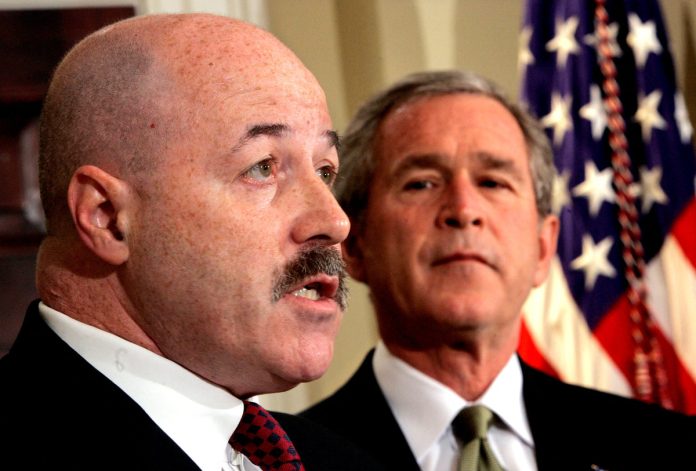NEW YORK: Bernard “Bernie” Kerik, who rose to national prominence after leading the New York police department through the September 11 terror attacks, died Thursday. He was 69.
FBI Director Kash Patel announced Kerik’s death on X, saying he passed away “after a private battle with illness.”
Lauding Kerik, Patel called him “a warrior, a patriot and one of the most courageous public servants this country has ever known.”
Kerik was the tough-talking head of the New York police when Osama bin Laden’s hijackers struck the World Trade Center towers with commercial passenger jets in September 2001.
In the traumatic days and weeks after the attack, Kerik, with his squat, muscular build, balding head and black moustache, became a familiar face to Americans across the country, as he helped then-mayor Rudy Giuliani guide New York through the crisis.
He’d served as Police Commissioner for less than a year when his life and career were altered forever by the terror attacks that killed nearly 2,750 people, including 23 NYPD officers.
When Giuliani’s second term ended shortly after the attacks, Kerik left office with him and continued their decades-long friendship and professional allegiance.
Kerik’s rough upbringing was detailed in a memoir, “The Lost Son: A Life in Pursuit.” Born in New Jersey to an alcoholic prostitute, he was abandoned by his mother and brought up by his father, and had a troubled childhood.
Early on his career took him around the world, with a spell on a military police posting in South Korea and working as a security consultant for the Saudi royal family in Saudi Arabia.
He later joined the New York Police Department, where he worked undercover in the narcotics division and helped bust 60 members of the notorious Colombian Cali drug cartel.
After leaving the Police Commissioner role post-9/11, Kerik stayed active in Republican politics, taking on a tour of duty to Iraq to help train their law enforcement in 2003 for former president George W. Bush.
He suffered another fall from grace after pleading guilty in 2009 to felonies, including tax fraud.
He admitted to accepting $255,000 worth of renovations to his apartment from a construction firm — suspected of having mob ties — angling for government contracts.
His plea helped him avoid a maximum potential sentence of up to 61 years behind bars.
Instead, he was sentenced to four years in prison. He was released in 2013.
Kerik received a presidential pardon in 2020, during President Donald Trump’s first term.
He later teamed up with Giuliani to investigate debunked allegations of election fraud following Trump’s 2020 loss, and was among those subpoenaed by lawmakers over accusations of plotting to overturn the election in the January 6, 2021 attacks on the US Capitol.








